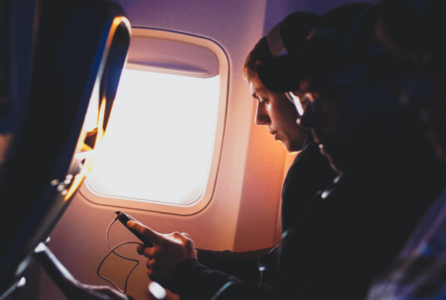Passenger urges airlines to 'do better' after spotting a glaring issue with in-flight entertainment
- Replies 6
It's no surprise how crucial accessibility and inclusivity are in our daily lives. We all deserve the chance to participate in life's opportunities, whether it's enjoying a movie or simply navigating a shopping centre.
However, it seems that some parts of the world are still falling behind when it comes to ensuring equal access for everyone. In one particular incident, a passenger on a Scandinavian Airlines flight came across a disappointing oversight in the plane's in-flight entertainment system.
Stand-up comedian Brad Klein was travelling from Chicago to Copenhagen on May 8 when he noticed the oversight. Since the flight lasted a considerable eight hours, Klein decided to pass the time by exploring the movie options available in the entertainment system.
What he discovered left him disheartened and compelled to share the issue with others. Through a video posted to social media, Klein revealed his findings: 'There are 99 movies I can watch on this flight. 99, okay. But only five have captions. Five.'

Now, Brad Klein is no stranger to the deaf community—both his parents are deaf, and his comedy shows are available in American Sign Language (ASL) as well as English. Given this, it's no surprise that he was disappointed when he encountered the limited options available to passengers with hearing disabilities on the flight.
To make matters worse, luck wasn't on his side when it came to movie choices with captions. Out of the five available titles, three belonged to the Fast and Furious franchise!
Jokingly, but with a hint of deserved irritation, Klein said, 'Don’t get me wrong, I love the Fast and Furious movies, all 600 of them. But come on! Only five per cent of your movies are captioned, and none are romcoms. Seriously?! It’s an eight-hour flight—do better. Caption all your movies, please.'
According to him, the video aimed to start a discussion and promote awareness regarding the challenges faced by those who rely on captions. Klein told a news outlet, 'While it is cool to see my video go viral, I’d much prefer to see the airlines caption all of their content—safety videos, gate announcements, in-flight plane announcements, entertainment, etc. I hope my video is seen by all of the airlines and it enacts positive change moving forward.'
The video quickly spread across social media, amassing over a million views and sparking conversations from viewers about accessibility and inclusivity in the world around us.
Comments pointed out that captions serve more than just the deaf or hard-of-hearing communities—international passengers who don't speak English as their first language or individuals with auditory processing challenges can also benefit from them.
'I'm not Deaf/HOH (hard of hearing), but I'm an autistic-ADHDer. There's no way I could concentrate on a movie while flying if I didn't have captions because there's literally no such thing as background noise for me – ALL OF IT is foreground,' added one viewer.
Another viewer shared their personal experience, 'I’m not deaf or HOH, but I cannot watch anything at all on TV or any screen without closed captions. I’ve been using CC my entire life because it helps so much with comprehension.'

The importance of captions for various groups of people (e.g. deaf, hard of hearing, non-native speakers, individuals with autism or ADHD)
As seen in Klein's video, the importance of captions extends far beyond providing assistance to just deaf or hard-of-hearing individuals. In fact, several other groups of people can greatly benefit from the inclusion of captions in various media, such as non-native speakers and those with autism or ADHD.
These diverse demographics deserve the same level of access and enjoyment when it comes to entertainment.
For non-native speakers, captions provide a valuable learning tool, making it easier for them to follow along with the dialogue and improve their understanding of the language. It also allows them to enjoy their favourite movies and shows without constantly pausing to look up words or phrases, ensuring a more seamless viewing experience.
Similarly, individuals with autism or ADHD can often struggle with auditory processing and may find it difficult to filter out background noises, which can be especially prevalent in environments such as an aeroplane.
Captions allow them to comprehend the content fully, allowing them to focus on specific words and sentences rather than being overwhelmed by the cacophony of sounds.
As our world becomes increasingly interconnected, ensuring that everyone has equal access to entertainment and information is crucial. By advocating for the widespread adoption of captions, we are creating an inclusive atmosphere in which all individuals can participate and interact with the world around them.
Klein's video serves as a powerful reminder that 'Captioning is essential for some but useful for all.' It's time for airlines to consider the bigger picture and ensure they cater to every passenger's needs, especially when it comes to long flights.

What are your thoughts, dear members? Do you have a preference for watching movies with subtitles? Or do you or someone you know rely on them for a better viewing experience? Let us know in the comments below!
However, it seems that some parts of the world are still falling behind when it comes to ensuring equal access for everyone. In one particular incident, a passenger on a Scandinavian Airlines flight came across a disappointing oversight in the plane's in-flight entertainment system.
Stand-up comedian Brad Klein was travelling from Chicago to Copenhagen on May 8 when he noticed the oversight. Since the flight lasted a considerable eight hours, Klein decided to pass the time by exploring the movie options available in the entertainment system.
What he discovered left him disheartened and compelled to share the issue with others. Through a video posted to social media, Klein revealed his findings: 'There are 99 movies I can watch on this flight. 99, okay. But only five have captions. Five.'

A plane passenger noticed a flaw with the in-flight entertainment system—most of the movies available did not have subtitles. Credit: Unsplash/d_mccullough.
Now, Brad Klein is no stranger to the deaf community—both his parents are deaf, and his comedy shows are available in American Sign Language (ASL) as well as English. Given this, it's no surprise that he was disappointed when he encountered the limited options available to passengers with hearing disabilities on the flight.
To make matters worse, luck wasn't on his side when it came to movie choices with captions. Out of the five available titles, three belonged to the Fast and Furious franchise!
Jokingly, but with a hint of deserved irritation, Klein said, 'Don’t get me wrong, I love the Fast and Furious movies, all 600 of them. But come on! Only five per cent of your movies are captioned, and none are romcoms. Seriously?! It’s an eight-hour flight—do better. Caption all your movies, please.'
According to him, the video aimed to start a discussion and promote awareness regarding the challenges faced by those who rely on captions. Klein told a news outlet, 'While it is cool to see my video go viral, I’d much prefer to see the airlines caption all of their content—safety videos, gate announcements, in-flight plane announcements, entertainment, etc. I hope my video is seen by all of the airlines and it enacts positive change moving forward.'
The video quickly spread across social media, amassing over a million views and sparking conversations from viewers about accessibility and inclusivity in the world around us.
Comments pointed out that captions serve more than just the deaf or hard-of-hearing communities—international passengers who don't speak English as their first language or individuals with auditory processing challenges can also benefit from them.
'I'm not Deaf/HOH (hard of hearing), but I'm an autistic-ADHDer. There's no way I could concentrate on a movie while flying if I didn't have captions because there's literally no such thing as background noise for me – ALL OF IT is foreground,' added one viewer.
Another viewer shared their personal experience, 'I’m not deaf or HOH, but I cannot watch anything at all on TV or any screen without closed captions. I’ve been using CC my entire life because it helps so much with comprehension.'
Key Takeaways
- A passenger on a flight noticed only five of the 99 available movies had captions, sparking discussion about accessibility for those with hearing loss.
- Brad Klein, a stand-up comedian raised by deaf parents, called on airlines to improve inclusivity by providing captioning in all of their content.
- The video posted by Klein gained more than four million views and received hundreds of supportive comments, noting that captions would also aid those with auditory processing problems or non-English speakers.
- Klein advocates for captioning to become standard, as it's 'essential for some but useful for all,' appealing to a wide range of passengers.
The importance of captions for various groups of people (e.g. deaf, hard of hearing, non-native speakers, individuals with autism or ADHD)
As seen in Klein's video, the importance of captions extends far beyond providing assistance to just deaf or hard-of-hearing individuals. In fact, several other groups of people can greatly benefit from the inclusion of captions in various media, such as non-native speakers and those with autism or ADHD.
These diverse demographics deserve the same level of access and enjoyment when it comes to entertainment.
For non-native speakers, captions provide a valuable learning tool, making it easier for them to follow along with the dialogue and improve their understanding of the language. It also allows them to enjoy their favourite movies and shows without constantly pausing to look up words or phrases, ensuring a more seamless viewing experience.
Similarly, individuals with autism or ADHD can often struggle with auditory processing and may find it difficult to filter out background noises, which can be especially prevalent in environments such as an aeroplane.
Captions allow them to comprehend the content fully, allowing them to focus on specific words and sentences rather than being overwhelmed by the cacophony of sounds.
As our world becomes increasingly interconnected, ensuring that everyone has equal access to entertainment and information is crucial. By advocating for the widespread adoption of captions, we are creating an inclusive atmosphere in which all individuals can participate and interact with the world around them.
Klein's video serves as a powerful reminder that 'Captioning is essential for some but useful for all.' It's time for airlines to consider the bigger picture and ensure they cater to every passenger's needs, especially when it comes to long flights.

Klein advocates for captioning to become standard in all films and media. Credit: Unsplash/macroman.
What are your thoughts, dear members? Do you have a preference for watching movies with subtitles? Or do you or someone you know rely on them for a better viewing experience? Let us know in the comments below!







